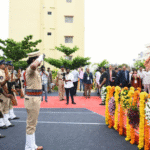Combined Commanders’ Conference 2025: Strategic Reforms Chart New Course

Prime Minister Narendra Modi inaugurated the 16th Combined Commanders’ Conference (CCC) in Kolkata, an apex brainstorming event for India’s defence establishment. Themed “Year of Reforms – Transforming for the Future,” the 2025 forum assembles top civil and military leaders, including Defence Minister Rajnath Singh, NSA Ajit Doval, and the chiefs of Army, Navy, and Air Force, to drive reforms, adaptation, and strategic modernization in India’s military.
Deliberations focus on increasing jointness—integrating the operational capabilities of all three military wings to respond more effectively to modern multi-domain challenges, including cyber capabilities, AI, and emerging technologies. The agenda includes transformative reforms, expansion of indigenous defence production, and heightened preparedness for complex regional security environments.
The event stands out for its inclusive nature: interactive sessions with officers of varying ranks ensure grassroots feedback shapes national strategy[7][12]. Additionally, this CCC also reviews best practices from recent operations, modernization projects, and lessons learned, ensuring field realities guide national planning.
As geopolitical volatility increases in Asia and global theatres, the Indian defence establishment is positioning itself as more agile, decisive, and tech-driven. The drive to institutional reform has been further invigorated by Make-in-India initiatives, indigenous defence manufacturing, and digital modernization of armed forces.
The Kolkata CCC, taking place just after the Prime Minister’s visits to northeast states and West Bengal, underscores India’s resolve to defend national interests, maintain regional stability, and be at the forefront of innovation and preparedness. The decisions from this conference are expected to influence India’s defence doctrine for years to come.
Deliberations focus on increasing jointness—integrating the operational capabilities of all three military wings to respond more effectively to modern multi-domain challenges, including cyber capabilities, AI, and emerging technologies. The agenda includes transformative reforms, expansion of indigenous defence production, and heightened preparedness for complex regional security environments.
The event stands out for its inclusive nature: interactive sessions with officers of varying ranks ensure grassroots feedback shapes national strategy[7][12]. Additionally, this CCC also reviews best practices from recent operations, modernization projects, and lessons learned, ensuring field realities guide national planning.
As geopolitical volatility increases in Asia and global theatres, the Indian defence establishment is positioning itself as more agile, decisive, and tech-driven. The drive to institutional reform has been further invigorated by Make-in-India initiatives, indigenous defence manufacturing, and digital modernization of armed forces.
The Kolkata CCC, taking place just after the Prime Minister’s visits to northeast states and West Bengal, underscores India’s resolve to defend national interests, maintain regional stability, and be at the forefront of innovation and preparedness. The decisions from this conference are expected to influence India’s defence doctrine for years to come.







